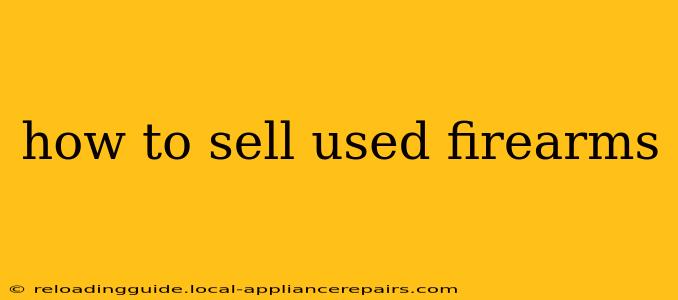Selling a used firearm can seem daunting, but with careful planning and adherence to the law, the process can be smooth and straightforward. This guide provides a comprehensive overview of how to sell used firearms safely and legally, covering everything from assessing your firearm's value to completing the transaction.
Understanding Federal and State Laws
Before you even consider listing your firearm, it's crucial to understand the complex web of federal and state regulations governing firearm sales. These laws vary significantly by location, so researching your specific state and local laws is paramount. Key aspects to investigate include:
- Licensing and Registration: Some states require licenses for firearm sales or registration of firearms. Failure to comply can lead to severe penalties.
- Background Checks: Federal law mandates licensed dealers conduct background checks through the National Instant Criminal Background Check System (NICS). While private party sales may have different requirements depending on your state, many states now require background checks even for private transfers.
- Prohibited Persons: Understanding who is legally prohibited from owning firearms is crucial. Selling to a prohibited person is a serious crime.
- Types of Firearms: Regulations can vary depending on the type of firearm (handgun, rifle, shotgun) and its features (e.g., capacity, modifications).
Assessing Your Firearm's Value
Accurately assessing your firearm's value is key to a fair transaction. Consider the following factors:
- Make and Model: The brand and specific model significantly impact value. Popular and sought-after models command higher prices.
- Condition: The firearm's physical condition, including wear and tear, scratches, and functionality, directly affects its value. A well-maintained firearm will fetch a better price.
- Accessories: Include any original accessories, such as boxes, manuals, and cleaning kits, as they add value.
- Market Research: Research current market prices on online platforms like GunBroker.com, GunsAmerica.com, or local gun forums to get a realistic valuation. Look at completed listings to gauge actual selling prices.
Choosing a Sales Platform
Several platforms cater to used firearm sales. Each has its own advantages and disadvantages:
- Online Marketplaces: Websites like GunBroker.com and GunsAmerica.com offer large audiences but usually involve fees.
- Local Gun Shops: Selling through a licensed dealer eliminates the need for a private transfer and ensures compliance with background check laws. However, you'll likely receive a lower price due to their markup.
- Gun Shows: Gun shows can offer a direct-to-buyer experience, but be prepared for haggling and a potentially more informal process.
- Private Sales: Selling privately to a known individual can sometimes yield the best price, but requires strict adherence to all legal requirements, including background checks where applicable.
Completing the Sale Safely and Legally
Once you've found a buyer, prioritize safety and legal compliance throughout the transaction:
- Meet in a Public Place: Always meet in a well-lit, public location with other people present for safety.
- Proper Documentation: Maintain thorough records of the transaction, including the buyer's identification, the firearm's serial number, and the date and time of the sale. Keep a copy of the bill of sale for your records.
- Bill of Sale: A detailed bill of sale is essential. It should include names, addresses, firearm description (make, model, serial number), and purchase price.
- Background Check (If Required): If your state mandates background checks for private sales, ensure the process is completed properly before transferring the firearm.
Beyond the Sale: Responsible Gun Ownership
Even after selling your firearm, responsible gun ownership continues. Ensure you've followed all legal procedures, and properly document the transaction to protect yourself from potential legal issues.
Disclaimer: This guide provides general information and should not be considered legal advice. Always consult with legal professionals and relevant authorities to ensure full compliance with all applicable federal, state, and local laws regarding firearm sales in your jurisdiction. The sale and possession of firearms are subject to strict regulations and should be handled with caution and responsibility.

